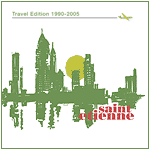|
|
 |
Dusted Reviews
Artist: Saint Etienne Album: Travel Edition: 1990-2005 Label: Sub Pop Review date: Mar. 17, 2005 |

|
|
|
 |
The best groups and artists spend good portions of their time mythologizing their surroundings. Consider Sonic Youth’s relationship with the New York underground, the way The Pastels continually eulogise Glasgow, how The Go-Betweens and The Saints’ early music is so inextricably tied to the cultural lockdown the Bjelke-Petersen government enforced upon Queensland, or Matt Valentine’s ability to channel the benign cosmic rays beaming from Vermont’s countercultural corps. So too with Saint Etienne and their love for London: the group’s music articulates London’s myths and mysteries, reading magic into its architecture, its cafés, Primrose Hill and the Barbican. And as with the Pastels, Sonic Youth, and the Go-Betweens, Saint Etienne’s music is cosmopolitan, conversational and convivial. Their work is dialogic: much like London itself, it’s a complication of multi-cultural influences, with French pop, bossa, 60s British girl-pop, acid house, dub technique, and German click-house captured and pressed into service as integrated elements of glorious pop songs that combine the forward-thinking with a wistful image of pop’s ability to articulate the psychology of the self and its place within everyday life and culture.
Travel Edition is yet another Saint Etienne compilation. And while Too Young to Die is a complete overview of the band’s early singles, and Smash the System may be more thorough, Travel Edition may be the best introduction to the group’s music, even if it skips a few important moments (no “London Belongs to me”, nothing from the Places to Visit mini-album, only one track from the band’s myriad Japanese-only or fanclub-only releases.) The songs collected from the early 1990s all interface with club culture and the pop charts: this was when Saint Etienne were at their most popular, and from their Balearic cover of Neil Young’s “Only Love Can Break Your Heart” to the camp-fire techno-folk of “Like A Motorway”, Travel Edition reaches some kind of transcendent vision of pop music as a nexus-point for modern living, the integration of night-time celebration and day-dream reverie, with lyrics that articulate and refine classic pop tropes: lost love, the elation of love found or regained, or the everyday observational.
By the late 90s, Saint Etienne shifted their focus from the giddiness of the pop single’s never-ending now to the grand sweep of the album format. A lot of Saint Etienne fans aren’t particularly enamoured of 1998’s Good Humour and especially 2000’s Sound of Water, but I’ve always thought these were the band’s best records. Sound of Water, in particular, is an astonishing song-suite: working with To Rococo Rot and Sean O’Hagan of the High Llamas, the album drips with Mandelbrot variations for electronics. It’s an immersive and blissful record which reaches a peak with the triumvirate of “Sycamore”, “Don’t Back Down” and “Just A Little Overcome”: sadly, Travel Edition only includes the album’s first two singles, “Heart Failed (in the Back of A Taxi” and the gorgeous nine-minute “How We Used to Live”. This is probably Travel Edition’s sole great missed opportunity, as through diving deeper into Sound of Water the group could have exposed listeners to its peculiar genius, setting off a re-evaluation of one of this current decade’s few pop masterpieces.
2002’s “Finisterre”, from the album of the same name, is maybe the most important song on this compilation. It’s a statement of intent and a clarion call, acting as a critique and celebration of London and of pop music. The song is particularly winning when it addresses music: there’s a classic moment where guest vocalist Sarah Churchill deadpans “I believe in love over cynicism, Donovan over Dylan”. Earlier in the song she observes that “there are too many bands that act lame, sound tame”, and that line made me think of “Finisterre” as an unconscious sequel to the Pastels’ “Coolport” from their Mobile Safari album, where Stephen McRobbie wants to “shut some record companies down, run some bands out of town / shed light on a corporate situation, consensus rock on the air.” Both bands often use music as a commentary on other music, as a corrective.
Saint Etienne’s music is dialectical in intent: the modern meets the quaint and old-fashioned, the avant-garde and the pop song exist in consensual embrace. They make lie of the tired ideological position that demands experimentation exist outside of populist interface, that melody is a restrictive force, a constraint the experimental leaves behind. The group engage in a conciliatory creative process, placed in service to the thrall of the giddy pop moment.
By Jon Dale
|







